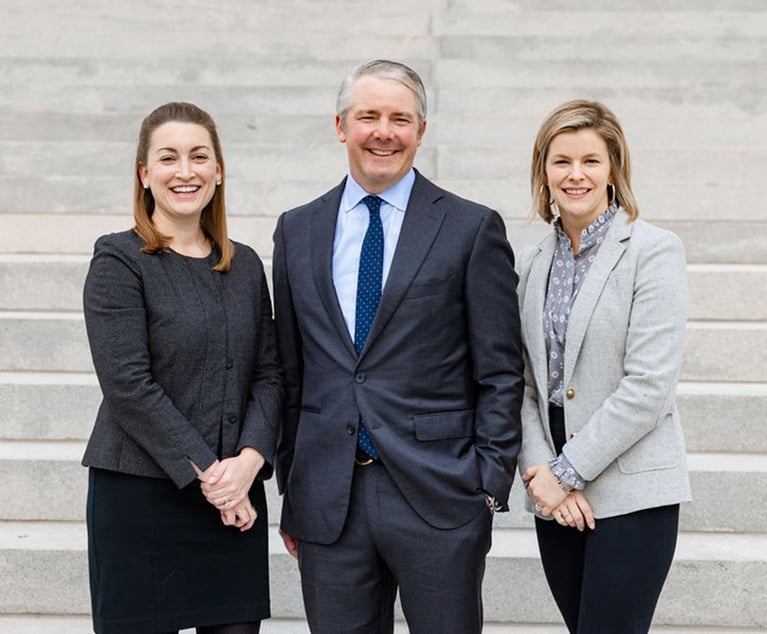 Trump International Hotel in Washington, D.C. Photo by Diego M. Radzinschi/ALM
Trump International Hotel in Washington, D.C. Photo by Diego M. Radzinschi/ALMDOJ Asks 4th Circuit to Halt State AG Emoluments Lawsuit
The filing comes after the D.C. and Maryland attorneys general issued over three dozen subpoenas to groups, including the Trump Organization.
December 17, 2018 at 05:29 PM
4 minute read
The Trump administration on Monday asked a federal appeals court to freeze an ongoing anti-corruption lawsuit against President Donald Trump, as part of a bid to stop a pair of state attorneys general from being able to peruse Trump's business records.
The Justice Department asked the U.S. Court of Appeals for the Fourth Circuit to pause proceedings in the case while it challenges a series of rulings by a federal trial court judge in Maryland. Monday's filing said U.S. District Judge Peter Messitte's earlier order rejecting a request to dismiss the complaint was “clear legal error” and called his refusal to certify an immediate appeal “a manifest abuse of discretion.”
The DOJ wants the appeals court to review those rulings, writing the lower court should have allowed an appeal because the case involves “purely legal threshold questions that, if resolved in the President's favor, would obviate (or at least significantly narrow) intrusive discovery into the President's personal financial affairs and the official actions of his Administration.”
Monday's request follows a flurry of subpoenas issued earlier this month by the offices of D.C. and Maryland Attorneys General Karl Racine and Brian Frosh, who sued Trump in June 2017 accusing him of violating the Constitution's foreign and domestic anti-corruption clauses. They claim Trump has reaped profits from foreign and domestic officials patronizing his Pennsylvania Avenue hotel, behavior they say the Constitution's emoluments clauses broadly prohibit.
“President Trump is going to extraordinary lengths to try to stop us from gathering information about how he is illegally profiting from the presidency,” Racine said in a statement, adding, “Unless the 4th Circuit rules otherwise, we will continue to work hard to gather the evidence needed to put a stop to the President's ongoing violations of the Constitution's original anti-corruption law.”
The more than three dozen subpoenas target groups such as the Trump Organization and related entities. The states are demanding tax returns and business records that could shed light on foreign or domestic government officials who are patronizing the Trump International Hotel in Washington, D.C. The state AGs began issuing the subpoenas after Messitte approved a timetable for discovery, with recipients required to respond by Jan. 3.
The subpoenas were also sent out to other groups, such as unnamed competing business and a handful of federal agencies. The subpoenas target, for example, the General Services Administration, which owns the lease for the old post office building where Trump built his hotel. They also target the Treasury Department, seeking information about whether Trump has followed through with an earlier vow to give profits he's made from foreign officials' visits to his hotel to the U.S. Treasury.
Messitte has allowed the lawsuit to progress, rejecting efforts by the Justice Department to have the case dismissed or immediately appealed. Earlier this year, the judge found the states had standing to sue, though he limited their lawsuit to Trump's Washington, D.C., businesses—namely the Trump International Hotel. Messitte also rejected in July the government's narrow reading of the term “emoluments.”
Meanwhile, Trump's personal attorneys at Consovoy McCarthy Park have also asked Messitte to dismiss the states' lawsuit on the grounds that Trump can't be sued in his individual capacity. They asked Messitte this month to schedule a hearing on the matter, noting Maryland and D.C. agreed “no discovery will be served against the President in his individual capacity unless and until the motion to dismiss is denied.”
Trump also faces two other emoluments-related lawsuits. One suit in Washington, D.C., which was brought by around 200 Democratic members of Congress and alleges a violation of the foreign emoluments clause, cleared an initial hurdle on the question of standing in September.
Another lawsuit was filed in New York by the nonprofit group Citizens for Responsibility and Ethics in Washington, which is working with the attorneys general in the Maryland case. A federal judge dismissed their suit last year, a ruling CREW appealed to the Second Circuit.
Read the appeal:
Read more:
This content has been archived. It is available through our partners, LexisNexis® and Bloomberg Law.
To view this content, please continue to their sites.
Not a Lexis Subscriber?
Subscribe Now
Not a Bloomberg Law Subscriber?
Subscribe Now
NOT FOR REPRINT
© 2025 ALM Global, LLC, All Rights Reserved. Request academic re-use from www.copyright.com. All other uses, submit a request to [email protected]. For more information visit Asset & Logo Licensing.
You Might Like
View All
‘Issue of First Impression’: New York Judge Clears Coinbase Appeal Amid Crypto Regulatory Clash
4 minute read
DC's Birchstone Moore Combines With Chicago-Founded Wealth Planning Firm
3 minute read

Trending Stories
Who Got The Work
Michael G. Bongiorno, Andrew Scott Dulberg and Elizabeth E. Driscoll from Wilmer Cutler Pickering Hale and Dorr have stepped in to represent Symbotic Inc., an A.I.-enabled technology platform that focuses on increasing supply chain efficiency, and other defendants in a pending shareholder derivative lawsuit. The case, filed Oct. 2 in Massachusetts District Court by the Brown Law Firm on behalf of Stephen Austen, accuses certain officers and directors of misleading investors in regard to Symbotic's potential for margin growth by failing to disclose that the company was not equipped to timely deploy its systems or manage expenses through project delays. The case, assigned to U.S. District Judge Nathaniel M. Gorton, is 1:24-cv-12522, Austen v. Cohen et al.
Who Got The Work
Edmund Polubinski and Marie Killmond of Davis Polk & Wardwell have entered appearances for data platform software development company MongoDB and other defendants in a pending shareholder derivative lawsuit. The action, filed Oct. 7 in New York Southern District Court by the Brown Law Firm, accuses the company's directors and/or officers of falsely expressing confidence in the company’s restructuring of its sales incentive plan and downplaying the severity of decreases in its upfront commitments. The case is 1:24-cv-07594, Roy v. Ittycheria et al.
Who Got The Work
Amy O. Bruchs and Kurt F. Ellison of Michael Best & Friedrich have entered appearances for Epic Systems Corp. in a pending employment discrimination lawsuit. The suit was filed Sept. 7 in Wisconsin Western District Court by Levine Eisberner LLC and Siri & Glimstad on behalf of a project manager who claims that he was wrongfully terminated after applying for a religious exemption to the defendant's COVID-19 vaccine mandate. The case, assigned to U.S. Magistrate Judge Anita Marie Boor, is 3:24-cv-00630, Secker, Nathan v. Epic Systems Corporation.
Who Got The Work
David X. Sullivan, Thomas J. Finn and Gregory A. Hall from McCarter & English have entered appearances for Sunrun Installation Services in a pending civil rights lawsuit. The complaint was filed Sept. 4 in Connecticut District Court by attorney Robert M. Berke on behalf of former employee George Edward Steins, who was arrested and charged with employing an unregistered home improvement salesperson. The complaint alleges that had Sunrun informed the Connecticut Department of Consumer Protection that the plaintiff's employment had ended in 2017 and that he no longer held Sunrun's home improvement contractor license, he would not have been hit with charges, which were dismissed in May 2024. The case, assigned to U.S. District Judge Jeffrey A. Meyer, is 3:24-cv-01423, Steins v. Sunrun, Inc. et al.
Who Got The Work
Greenberg Traurig shareholder Joshua L. Raskin has entered an appearance for boohoo.com UK Ltd. in a pending patent infringement lawsuit. The suit, filed Sept. 3 in Texas Eastern District Court by Rozier Hardt McDonough on behalf of Alto Dynamics, asserts five patents related to an online shopping platform. The case, assigned to U.S. District Judge Rodney Gilstrap, is 2:24-cv-00719, Alto Dynamics, LLC v. boohoo.com UK Limited.
Featured Firms
Law Offices of Gary Martin Hays & Associates, P.C.
(470) 294-1674
Law Offices of Mark E. Salomone
(857) 444-6468
Smith & Hassler
(713) 739-1250










